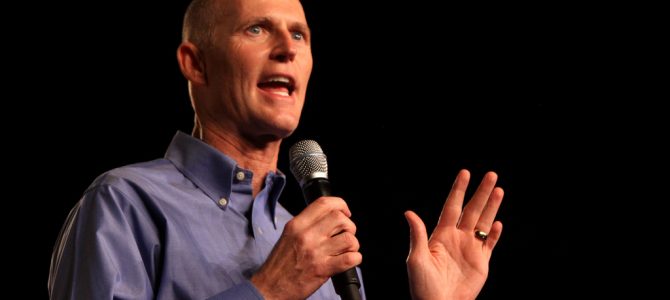
Determined to let no event pass without a political spin, the Hillary Clinton campaign now looks to portray the hurricane ravaging Florida as part of a Republican plan to disenfranchise would-be Democratic voters.
With Hurricane Matthew’s arrival coinciding with the deadline for voter registration, Clinton campaign manager Robbie Mook smells a rat, somehow. “We are hoping and expecting that officials in Florida will adapt deadlines to account for the storm,” Mook is quoted in a Politico article on Thursday. One lawyer at a firm that does work for the campaign, Jean-Jacques Cabou, promised in a tweet that Florida Gov. Rick Scott’s inaction would result in a lawsuit.
The flaw in the Clinton campaign’s logic is that they are threatening litigation because Scott is following the law. Voting registration deadlines, in Florida as in other states, are matters of state law. The Florida Department of State’s website lists October 11 as the deadline to register, and state statute confirms it. Florida Statute § 97.055 says “the registration books must be closed on the 29th day before each election and must remain closed until after that election.”
Note the words of the statute are “must be.” It does not say “may be” or “can be” or “might be if the governor feels like it” or “if the weather is nice.” There is no discretion, no room for interpretation. Florida voters have been able to register to vote for the 2016 election their entire adult lives until October 11, but on that date, registration ends for this year’s contest. There is one exception, for soldiers who were stationed abroad and discharged after the 29-day deadline, but that is it. Beyond that one set of circumstances, the Florida legislature has written a law that allows for no wiggle room.
The Legislature Rejected Special Accommodations
That they included any exception is telling. It indicates the legislators considered various scenarios in which a hard 29-day deadline might be unworkable. They saw fit to include one in the law, but declined to include others. It is clear, then, that they knew how to make an exception, and chose to do so just once.
It was not that Floridians are unaware of hurricanes; they happen fairly regularly in the region. They knew about hurricane season and knew it could affect people’s ability to move around the state and perform tasks like registering to vote at the last minute. Even with this knowledge, they decided not to allow any weather-related exceptions.
In the legislature’s view, therefore, the law is complete. Scott, as governor, has no lawmaking power. His job is, as Florida’s constitution states, to “take care that the laws be faithfully executed.” The Politico article notes this flaw in the Clinton campaign’s thinking, admitting that “it’s not clear if a plaintiff could prevail because Florida law doesn’t explicitly grant the governor the power to move voter-registration deadlines.” The word explicitly is something of a hedge: there is no such power vested in the governor, implicitly or explicitly.
Blatant Ignorance About Basic American Government
There is no legal justification for what Mook and Cabou demand, only a firmly stated belief that it is what they want because it would benefit their candidate. Their ignorance of separation of powers and even the very basics of how American government functions could be excused, except that it is part of a trend among Democrats (and some Republicans) of assuming that our state and federal executives are elected dictators. As with Barack Obama’s promise to enact immigration reforms by fiat when Congress refused to accede to his will, this idea presumes that any problem can be solved by government, and “government” means “the executive.”
Our state and federal governments are built around a strict separation of powers. This is done specifically to prevent the sort of unilateral action Mook proposes. It is slower, admittedly, and more complicated to get the legislature to amend a law. A governor who could rule by decree would be more efficient, but a system of government that allowed such actions could no longer properly be called a democratic republic.
Also, of course, such a system would work both ways. Mook and Cabou insist Scott must unilaterally change the law in a way that they believe benefits them, and promise to sue if he will not agree. But does anyone believe they would not be the first to cry “tyranny” if Scott moved the date in the opposite direction?
We are a nation of laws, and laws are written by legislatures. If Florida’s legislature wants to amend their election laws, they may do so. If they want to draft an exception for inclement weather, they may do that. If they want to write a law that leaves the voter registration deadline entirely at the governor’s discretion, even that may be permissible.
But they have not done so. Instead, they wrote the more normal sort of law, one that tells the state government what it may and may not do. They may register voters for November’s election until October 11. They may not do so beyond that date. The Clinton campaign is asking Scott to break the law. He is right to refuse them.









